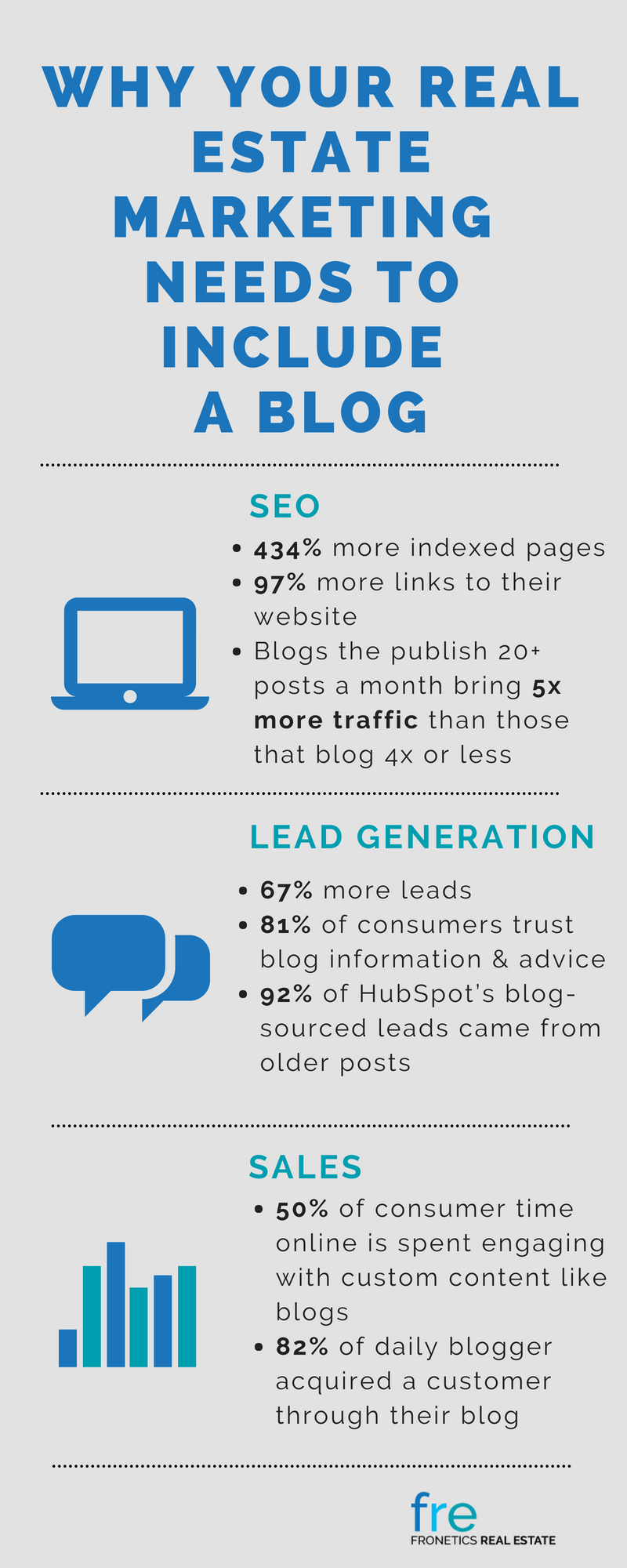Posts Tagged "sales"

Infographic: Statistics that Prove Why Your Real Estate Marketing Needs to Include a Blog
If you’re a real estate marketer who’s not blogging, you’re missing out.
Everyone knows you need a property website to succeed in this industry. But when it comes to making that website competitive, many abandon the brightest idea that would help them in doing so — namely, blogging.
Real estate blogging does its bit for lead generation, SEO, and sales. So if you think your property can thrive without it, you might want to think again.
Search engine visibility
As search engine algorithms get increasingly complex and sophisticated, the quality of your website’s content becomes more and more important. It’s your content that informs search engines about your site (not just keywords anymore), improving your rank in relevant search queries. And the stats bear it out — according to HubSpot, companies that blog receive 434% more indexed pages on average and 97% more links to their website.
Another fact to consider: according to a recent study by Search Metrics, the average word count of the highest ranking content in Google is between 1,140-1,285 words. In other words, long-form content, like blog posts, is one of the best things you can do to improve your website’s SEO.
But don’t be fooled into thinking that quantity outranks quality. Simply pumping out a high word count isn’t enough. Your content needs to be well-written, thoroughly researched, and engaging.
Lead generation
Blog content is ideal to share (and link to) in email or social media marketing campaigns. It can help undecided leads learn about your properties and sway them in a positive direction. Sharing your blog posts on your social media accounts helps give validity and authority to your company, as you disseminate content you created yourself.
A recent study from the Content Marketing Institute found that 67% more leads are generated by companies with an active blog. Not only that, 81% of U.S. online consumers trust information and advice from blogs. So your blog is your best bet in terms of becoming a trusted resource for your audience — leading directly to more effective lead generation and nurturing.
Sales and relationships
61% of buyers report feeling better about a company that delivers custom content and are therefore more likely to buy from that company. And furthermore, HubSpot reports that 50% of consumer time online is spent engaging with custom content — like blogs. And perhaps most powerfully, 82% of marketers who blog daily acquired a customer using their blog, as opposed to 57% of marketers who blog monthly. Blogging helps you sell real estate, and it helps you build lasting and fruitful relationships with your audience.
Check out our infographic for statistics on why your real estate marketing strategy should include blogging.
Infographic: Why your real estate marketing should include a blog
Related posts:
- 4 Ways a Blog Can Help You Sell Real Estate
- Drive More Traffic and Generate More Leads with Your Real Estate Blog with our Editorial Calendar Template
- Fronetics Real Estate Blog Named Top 60 Real Estate Marketing Blog
Posts Tagged "sales"

Your Content Should Not Include a Sales Pitch. Do This Instead.
Trying to pass your sales pitch off as content will only hurt your content marketing efforts. Start helping potential buyers instead.
Think your blog is a refreshing new way to highlight your properties’ selling points? Do your blog posts include verbiage like “competitive rates,” “prime location,” or “investment opportunity?” Stop right there. Everyone you reach probably knows right away that you are trying to sell them something, and they will quickly move on.
As counterintuitive as it may sound, being “salesy” will make potential buyers look elsewhere, or run in the opposite direction — perhaps to your competition. The best way to win buyers and renters is to stop trying to sell. Content that helps prospective buyers envision themselves in your property is what will grow your business.
Nobody welcomes a sales pitch
Admit it: you tune out anyone that comes across as trying to sell you something. You get emails, voicemails, and social media updates with “information” that is really a not-so-cleverly disguised sales pitch. What do you do? Most likely you hit delete, or you do not read past the first sign of a sales promotion.
So you know deep down that “salesy” does not sell. Yet according to a recent study of 500 global marketers from the Economist Group, many content marketing programs are doing just that: being promotional throughout their content efforts. In fact, 93% of the marketers surveyed said they directly connect content to a specific product or service.
Prospective buyers see right through this trick. Like you, most of your potential investor base is turned off by an overt sales pitch.
Focus on your audience to increase yield
So what should your content be doing? Rather than forcing your properties on your potential investors, take the time to answer their questions. Be the expert advice they are seeking. Help them envision themselves in one of your properties. You can do this by:
- Keeping content informative and educational. Your content should hold value for your readers.
- Letting your content demonstrate expertise. It should give the reader a favorable impression of you and your real estate business. They should walk away trusting your ideas.
- Educating your readers about the amenities nearby and the neighborhood. Offer information about things to do nearby or events that make your location ideal for your target audience. For example, music lovers will love to know that they could be living near a concert venue; or parents will want to know about the local school system.
The philosophy of content marketing is to offer help, to educate, and, at times, to entertain your target audience. This is accomplished by focusing on your potential buyers’ needs and interests, not by overtly pitching your properties. When your buyers understand you’re not trying to force a sale at any cost, you gain their trust and respect, and this is what brings in sales.
Related posts:
- Marketing vs. Sales: Why There Shouldn’t Be a Competition
- Content Marketers: Don’t Fire Your Sales Staff
- Most B2B Buyers Use Social Media in Their Research




